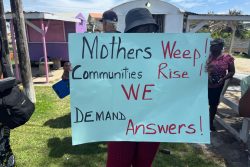Barama has been given a number of guidelines by which it has to commission an audit of its operations in the wake of a number of findings which an investigation unearthed some weeks ago leading to the company being fined $96.4M.
The Guyana Forestry Commission (GFC) and the Agriculture Ministry, some months ago, began an investigation involving Barama and a number of smaller forest operators after the GFC’s systems checks revealed instances of under-declaration of forest produce and false declarations of origin.
Speaking to this newspaper recently, Minister of Agriculture Robert Persaud said the company had a limited time by which to agree and accept the guidelines for the independent investigation.
Upon the revelation of the findings, the company had indicated that it was willing to bring in auditors from overseas to find where the faults occurred. Barama has been meeting with officials of the GFC and the ministry over the last weeks with a view to bringing the impasse to a speedy end.
The company has a self-imposed ban on speaking to the press. But, in a statement soon after the revelations, Barama maintained that any anomalies discovered were unintentional and were the result of operational realities and practices and made the point that it was part and parcel of operating in any dynamic and geographically challenging industry.
The statement said that over the past 15 years of operation in Guyana, Barama has endeavoured to operate strictly within the jurisdiction and confines of Guyanese laws and regulations. “As Guyana’s largest foreign investor, it is in the company’s best interest to adhere to the GFC forestry practices to ensure the company’s long-term presence in Guyana,” the statement said.
President Bharrat Jagdeo, speaking at a recent event, said that if entities like Barama couldn’t follow the rules then they would have to leave, in keeping with the administration’s recent tough stance on forestry defaulters and the President’s commitment to making the country’s rainforest available to fight climate change.
Persaud had said that an interim supply arrangement for the plywood factory would have been put in place but this would have been predicated on the ending of sub-contractual arrangements for logs from other concessions since Barama is believed to have large enough areas of concession. However, he said that must be done through a process based on constructive engagement rather than manipulation of issues and processes and the issuance of threats and reckless statements.









